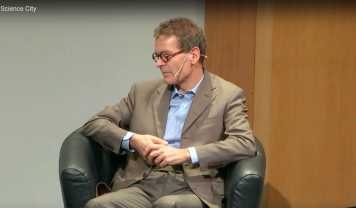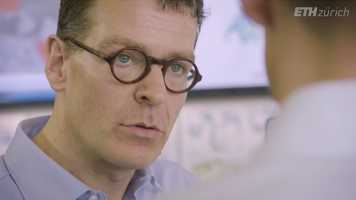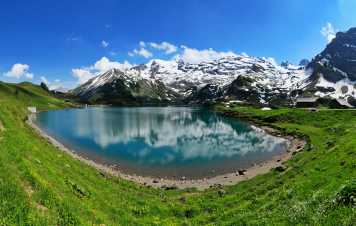Archive
December 2024 – CLIMADA Technologies affiliated with ETH AI Center

CLIMADA Technologies, an ETH start-up co-founded by Prof. David N. Bresch, is now affiliated with the ETH AI Center. Read more here
October 2024 – Simona Meiler wins 2024 SCOR Zurich’s annual Actuarial Award
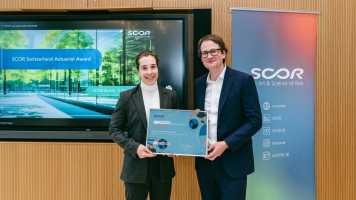
WCR’s Simona Meiler is awarded with the award for her PhD thesis on uncertainties in tropical cyclone risk assessment. Read more about the award external page here
29.09.2024 – Prof. Bresch at Sternstunde Philosophie in SRF

Prof. David N. Bresch discusses how people around the world need to adapt to climate change. Watch the discussion external page hereexternal page
17.06.2024 - CLIMADA wins first prize at Venture Awards

ETH spin-off CLIMADA Technologies won the first prize in the Finance&Insurance category at the Venture Awards. Read more about the awardexternal page
24.03.2024 – Mangrove forests as breakwaters
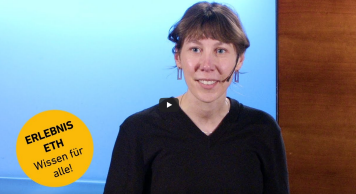
WCR’s Sarah Hülsen gave a lecture at Treffpunkt Science City about the benefits of the restoration of natural coastlines. Watch the lecture external page here
15.11.2023 - New publication: Global protection from tropical cyclones by coastal ecosystems—past, present, and under climate change

The study led by WCR’s Sarah Hülsen delves into the vital role coastal ecosystems play in disaster risk reduction and climate change adaptation. external page Read the paper or external page read the blog post by the author.
01.09.2023 - CAS ETH in Climate Innovation is now open for registration

Working with real world case studies, the Climate Innovation programme empowers climate change leaders with the necessary skills and knowledge to support and lead the transition towards net zero emissions. Read more here.
30.03.2023 – New blog post: Increasing countries’ financial resilience through global catastrophe risk pooling
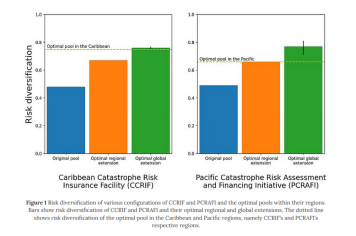
This blog post gives a concise overview of the main messages of Dr. Alessio Ciullo’s study which finds that optimal global pooling generally provides greater financial resilience than optimal regional pooling and that both can significantly increase the risk diversification of the existing pools. external page Read the blog post or external page read the paper.
15.02.2023 – Short student interview with Prof. David N. Bresch
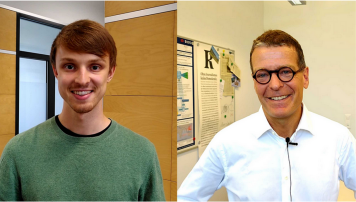
As part of the "Who Cares?" short interview series, ETH students ask former graduates in what way their ETH studies have contributed to their commitment to sustainability today. Have a look at Prof. Bresch’s answer here.
February 2023 - Publication turned into a visual story
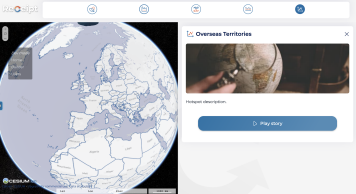
As part of the external page RECEIPT EU H2020 project, a recent external page publication by Dr. Alessio Ciullo, Prof. David N. Bresch, Prof. Olivia Martius and Prof. Eric Strobl on the impact of tropical cyclones on the stability of the European Union Solidarity Fund was now turned into a visual story. The story will be used to help stakeholders and decision makers to better understand the impact of extreme weather events on the fund’s stability.
06.12.2022 – Extraordinary seminar: A physics-based approach to tropical cyclone risk assessment
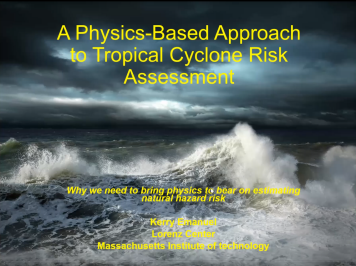
Prof. em. Kerry Emanuel from MIT, during his visit to the WCR group, gave a special seminar in which he explains why we need to bring physics to bear on estimating natural hazard risk. Read more
10.11.2022 – SRF article: Three decades of climate summits: to what effect?

Climate summits since Rio in 1992 to Kyoto in 1997 to Glasgow in 2021 have agreed on targets that were easy to communicate politically, such as the 2°C target. According to Prof. David N. Bresch, however, one catch with the targets is that there are no uniform measurements and countries are free to set their own commitments. external page Read more (in German)
07.11.2022 - COP27: Interview with Prof. David N. Bresch
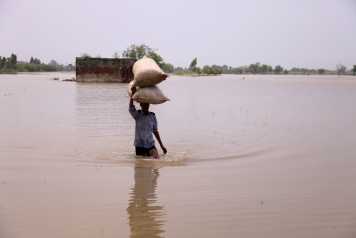
In an interview with the Aargauer Zeitung, Prof. Bresch talks about difficulties with climate justice and possible ways forward. Read more (in German) Download here (PDF, 2 MB)
19.10.2022 - New publication: Intercomparison of regional loss estimates from global synthetic tropical cyclone models
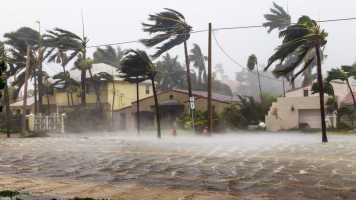
Synthetic models of tropical cyclones (TCs) are a vital tool for TC risk assessment. They are specifically designed to overcome the spatial and temporal limitations imposed by historical TC data. This study by Simona Meiler et al. presents the first global model intercomparison of four synthetic TC datasets in the impact space. external page Read more
22.04.2022 - The social impact of disasters
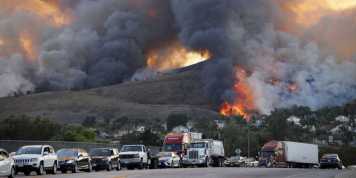
Human geographer Christine Eriksen and Prof. David N. Bresch explain the influence of societal decisions on the extent of natural disasters. Read more
23.03.2022 – New publication: Stepping Up Support to the UN and Humanitarian Partners for Anticipatory Action
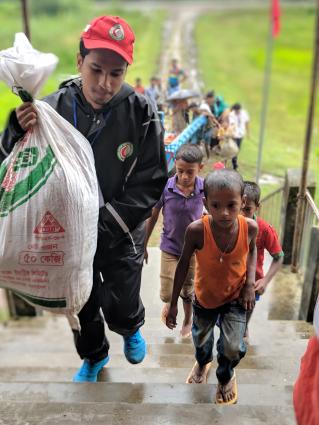
This article by Dr. Thomas Röösli, Prof. David N. Bresch et al. was published in the Bulletin of the World Meteorological Organisation. external page Read more
24.02.2022 – Interview about review article «Impact forecasting to Support Emergency Management of Natural Hazards”
February 2022 - New publication: Widening the common space to reduce the gap between climate science and decision-making in industry
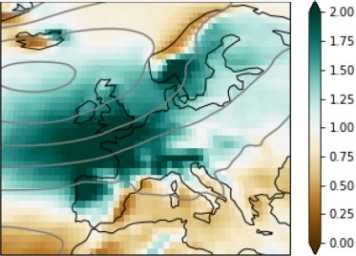
Climate scientists and industry leaders lack a shared language, which limits productive collaboration. In this article Luise Fischer et al. have developed a framework for addressing this issue, with a view to improving climate resilience. Read more
November 2021 – Samuel Eberenz wins SCOR Switzerland Actuarial Award
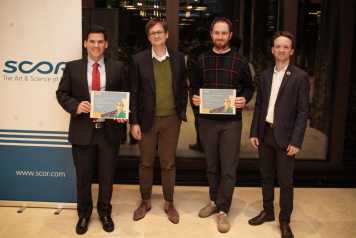
WCR’s Dr. Samuel Eberenz is awarded with the 2021 SCOR Switzerland Actuarial Award for his outstanding doctoral thesis “Globally Consistent Assessment of Climate-related Physical Risk». external page Read more
26.10.2021 – Prof. Bresch at Planet Hope

Climate change and the destruction of landscapes pose unprecedented challenges to our planet and humanity. What are the drivers of change, what will it cost us? What will it take to restore our ecosystems? Prof. David N. Bresch participated in a panel discussion to debate these questions in Bern. external page Read more
02.09.2021 – SIA interview with Prof. David N. Bresch

In an interview with external page SIA (Swiss Society of Engineers and Architects) Prof. Bresch explains why many people find it so difficult to perceive climate change as a serious threat. Read more (in German) external page here
21.07.2021 – Prof. David N. Bresch comments on extreme weather events in “10 vor 10” interview on SRF
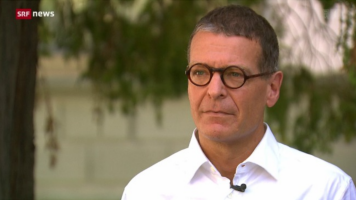
The frequency and intensity of extreme weather events are increasing measurably, and so are the damages. Prof. Bresch explains what this means for insurance companies. Watch the interview (in German) external page here.
18.06.2021 – New publication: Addressing the human cost in a changing climate
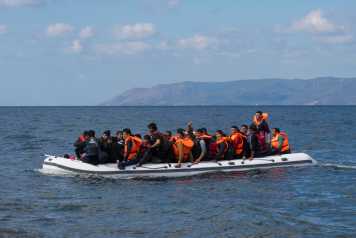
This article, which was written jointly by external page iDMC, external page IIASA, external page PIK and the WCR group at ETH Zurich was published in the leading research publication Science. external page Read more
26.05.2021 – Prof. Bresch at Swiss Re Climate Resilience Summit
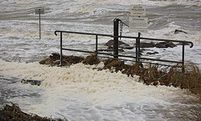
Prof. David N. Bresch participated at the panel discussion “Climate change: no action not an option – The impact of climate change on EMEA”. external page Read more
07.05.2021 – Prof. David N. Bresch in Swiss journal Beobachter
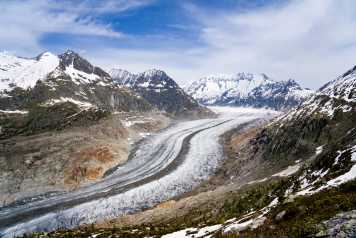
With regard to climate sciences and climate change mitigation “the primary problem is not a lack of knowledge, but a lack of action”, according to Prof. Bresch. Read more (in German) external page here
13.04.2021 – Swiss Global Change Day
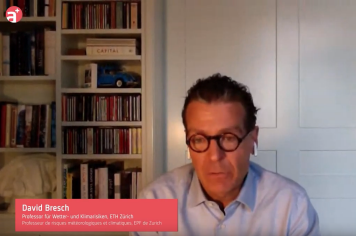
Prof. David N. Bresch attended the Swiss Global Change Day 2021 where the Swiss National Covid 19 Taskforce met with climate scientists. Watch a recording of the discussion external page here. (Prof. Bresch appears from 28:10 of the recording)
09.04.2021 – New publication: Climate signals in river flood damages emerge under sound regional disaggregation
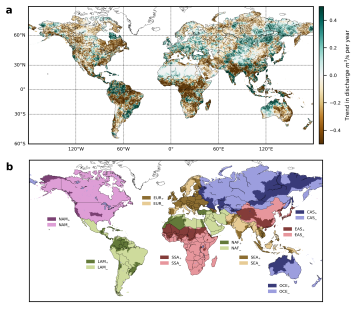
This study by Inga Sauer et al. introduces an empirical modelling approach allowing to separate climate and socio-economic drivers of historical damages caused by fluvial floods. It shows that climate signals in damages are clearly detectable in Asia and Latin America. external page Read more
24.03.2021 – New publication: Global warming and population change both heighten future risk of human displacement due to river floods
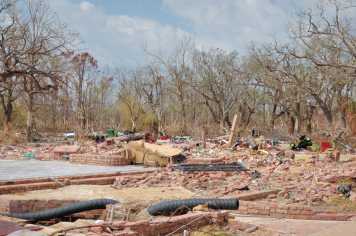
Floods are a major driver of displacement and they are influenced by climate change. The new publication by Pui Man Kam et al. shows the future flood displacement risk, and how climate change and demographic and socio-economic factors will influence it. external page Read more
10.11.2020 – Panel Discussion at Science City
04.08.2020 – Launch of Extreme Heat Resilience Alliance EHRA
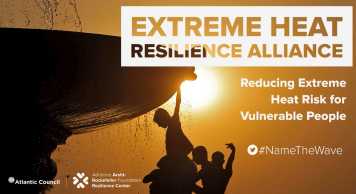
On this day, the Atlantic Council’s Adrienne Arsht-Rockefeller Foundation Resilience Center, along with 30 global partners including ETH’s Weather and Climate Risks Group, announced the formation of the Extreme Heat Resilience Alliance (EHRA). Read more external page here
May 2020 – New ECA community page

There is a new Economics of Climate Adaptation community page, please have a look external page here.
April 2020 – New online game available
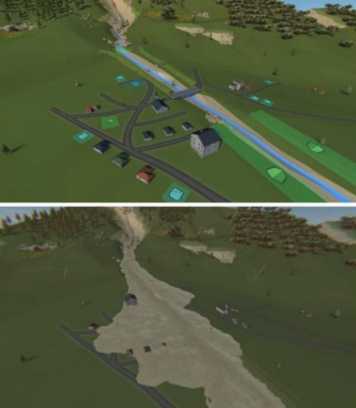
Prof. Dr. David N. Bresch was involved in the development of the new online game MurGame, sponsored by, among others, the external page Präventionsstiftung der Kantonalen Gebäudeversicherungen, of which Prof. Bresch is a member of the board. Play the game (in German) external page here.
01.03.2020 – What art can do but science cannot: Panel discussion with Professor David N. Bresch
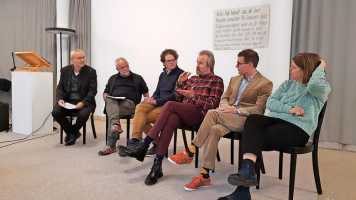
In the Kunsthaus Glarus Prof. David N. Bresch argued that “art can reach people and trigger questions, but it should not be used as a political tool.” Read more (in German) external page here
25.02.2020 – Book review by Benedikt Knüsel: "Philosophy and Climate Science by Eric B. Winsberg"
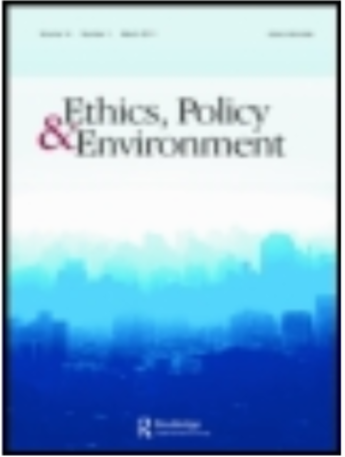
In his book review, Benedikt Knüsel outlines why “Philosophy and Climate Science” by Professor of Philosophy Eric Winsberg is such a timely piece as an introduction to the young field of philosophy of climate science. external page Read more
19.02.2020 – New BAFU publication: Klimawandel im Ausland – Risiken und Chancen für die Schweiz
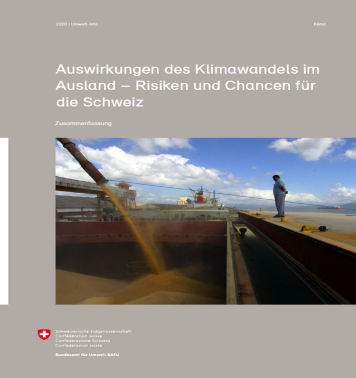
Due to its inter-connectedness in the world, Switzerland is indirectly affected by the consequences of global climate change. The BAFU publication shows the impact that climate changes abroad have on this country. external page Read more
24.01.2020 – Comment on SRF Radio by Prof. David N. Bresch

In his keynote at the University of Zurich on 21st January, Nobel Laureate Prof. William Nordhaus called for the establishment of a Climate Club. In a short interview at the event Prof. David N. Bresch welcomed this idea. Read or listen to the comment (in German) external page here.
December 2019 – Two new publications:

Instrumente für eine wirksame und effiziente Klima- und Energiepolitik
The Swiss Academy of Sciences published this fact sheet which provides an overview of the economic tools, regulations, agreements and sources of information on offer, and shows which goals can be achieved best by these. Download Read more (PDF, 532 KB)
Chancen und Auswirkungen einer CO2-Lenkungsabgabe auf Treibstoffe
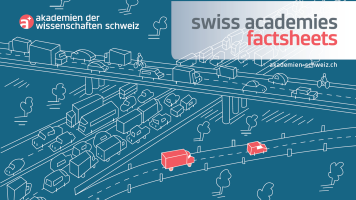
The second fact sheet describes various policies in the field of mobility and explains in particular how such policies can be designed in a socially acceptable way and how they affect peripheral regions. Download Read more (PDF, 666 KB)
03.12.2019 – Innovativ. Nachhaltig. Erfolgreich. New publication
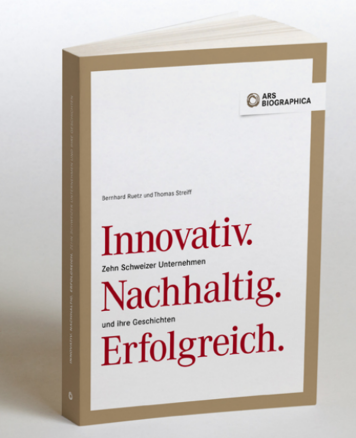
This second book with the topic «Innovativ. Nachhaltig. Erfolgreich.» (Innovative. Sustainable. Successful.) introduces ten Swiss companies which prove through long-term value-oriented strategies that sustainability pays off. In the book Prof. David N. Bresch points out that “Switzerland has enough expertise to be leading the way in sustainable future technologies.” external page Read more
December 2019 – Assessing the impacts of climate change on flood displacement risk
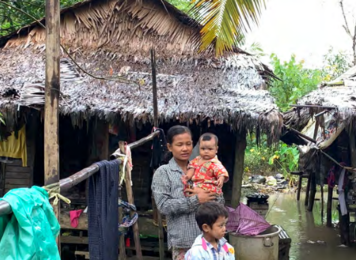
With so many people already affected by climate change and extreme weather events predicted to become more frequent and/or severe in many parts of the world, it is vital to establish the magnitude of future displacement risk, its drivers and what might be done about it. Read more
25.11.2019 – Understanding Climate Risks – What does it mean for San Salvador?
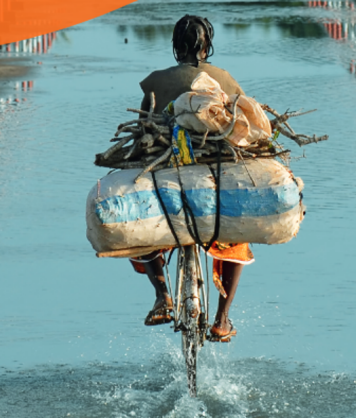
A new publication by the InsuResilience Solutions Fund (external page ISF) in cooperation with external page IDF and ETH Zurich illustrates the importance of climate risk analysis as essential instrument of comprehensive climate risk management on the basis of results of a San Salvador case study. Read more
October 2019 – Herrenhausen Conference “Extreme Events – Building Climate Resilient Societies”
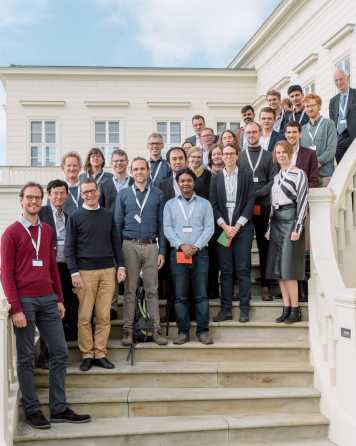
From 9th to 11th October 2019 more than 130 scientists and practitioners from 30 countries and UN organisations met at the Herrenhausen Conference “Extreme Events – Building Climate Resilient Societies” in Hannover at Herrenhausen Palace, among them Prof. David N. Bresch. external page Read more
24.09.2019 – CAS ETH in Collaborative Decision Making Under Uncertainty
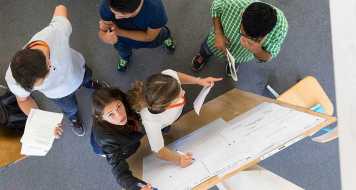
ETH Zurich launched a new Certificate of Advanced Studies, called “Collaborative decision making under uncertainty”. Read more
11.09.2019 – Benedikt Knüsel wins essay prize
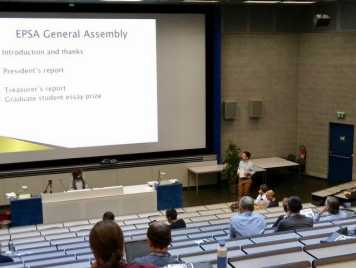
WCR's Benedikt Knüsel wins the prize for the best Graduate Student Paper at the European Philosophy of Science Association (EPSA) Biennial Meeting with his essay "Understanding Climate Phenomena with Data-Driven Models". external page Read more
19.07.2019 – New paper: CLIMADA v1 – a global weather and climate risk assessment platform
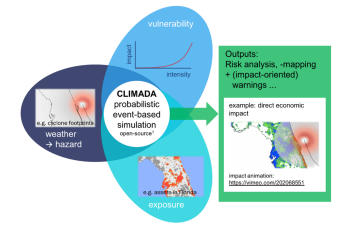
The need for assessing the risk of extreme weather events is ever increasing. In addition to quantification of risk today, the role of aggravating factors such as high population growth and changing climate conditions matters, too. We present the open-source software CLIMADA (CLIMateADAptation), which integrates hazard, exposure, and vulnerability to compute the necessary metrics to assess risk and to quantify socio-economic impact. Read the full paper Download here (PDF, 870 KB).
29.04.2019 – Launch of Adrienne Arsht-Rockefeller Foundation Resilience Center
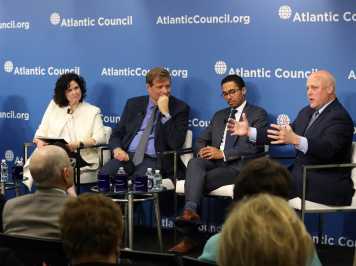
The Weather and Climate Risks Group is proud to be a partner of the external page Adrienne Arsht-Rockefeller Foundation Resilience Center launched by the external page Atlantic Council on Monday, 29th April 2019. By identifying, implementing, and scaling solutions to the urgent crises of climate change, migration, and security, the new Center seeks to enhance the resilience of one billion people by 2030. The WCR Group will contribute through impact modelling and support of stakeholder engagement with the aim to strenghten societal resilience by application of its Economics of Climate Adaptation approach. Please find more information external page here.
February 2019 – Physical risk framework - Understanding the impacts of climate change on real estate lending and investment portfolios
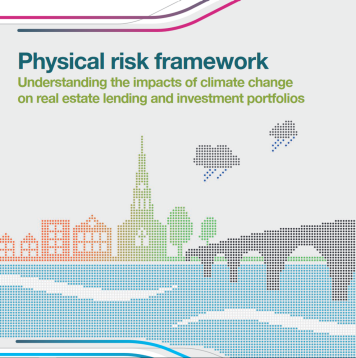
This report shows how investors and lenders can make use of well-established natural catastrophe risk models to improve their management of some of the physical risks of climate change. Investors, lenders, insurers and policymakers will need to consider how expected increases in risk can be managed in the most cost-effective manner. Read more or read the external page full report
20.11.2018 – New report: Managing Physical Climate Risk - Leveraging Innovations in Catastrophe Risk Modelling
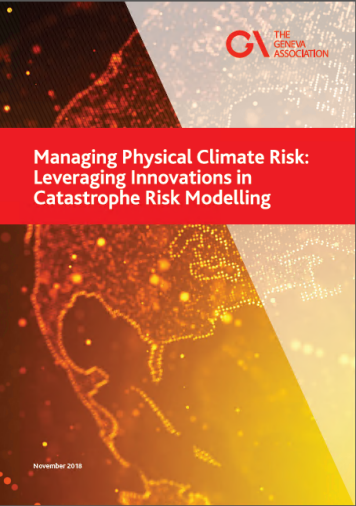
As the effects of climate change become more severe, catastrophe risk modelling is more relevant than ever. Check out the Download research brief (PDF, 657 KB) or read the Download full report (PDF, 732 KB)
13.11.2018 – Launch of the CH2018 Climate Scenarios
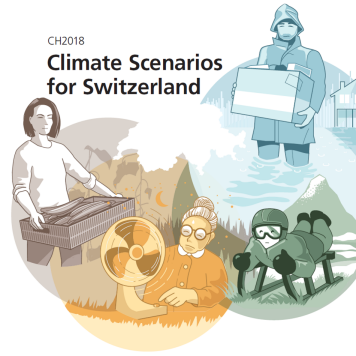
The CH2018 Climate Scenarios show where and how climate change affects Switzerland, be it by more hot days, dry summers, heavy precipitation or winters with little snow. Watch the external page video or browse the Download brochure (PDF, 6.3 MB)
October 2018 – Interview with David Bresch in "Schweizer Monat"

Natural disaster risk can be calculated. This provides a basis for professional risk management. In this development the societies’ knowledge, traditions and time scales play a significant role. Read the interview with Prof. David N. Bresch (in German) external page here
24.10.2018 – New climate scenarios for Switzerland

The latest climate scenarios for Switzerland provide private and political decision makers with a fact base from which to take the most effective measures for adapting to climate change and for climate protection. In this process change can also be considered as opportunity. Read more (in German) external page here
04.10.2018 – MOOC open for registration
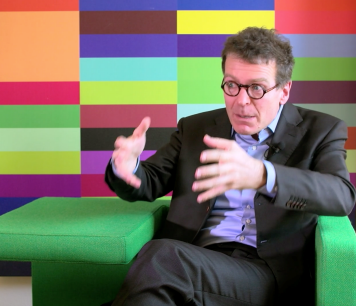
The MOOC A Resilient Future: Science and Technology for Disaster Risk Reduction has been launched on October 4, 2018. This edition was open until September 2019. Prof. David N. Bresch contributes two lectures. external page Read more
22.05.2018 – Distinguished lecture at SLF Davos
11.04.2018 – Comparing the cost effectiveness of nature-based and coastal adaptation: A case study from the Gulf Coast of the United States

TNC, UCSC and ETH Zurich have partnered to produce the single most rigorous direct comparison of the cost effectiveness of nature-based (green) vs artificial (gray) infrastructure. The study quantifies the flood risks to people and property across the Gulf of Mexico at present and under future climate change and economic growth scenarios. Nature based solutions are the most cost-effective! This article is quoted on external page NOAA's front page of Natural Infrastructure. Read more
09.02.2018 – Prof. David N. Bresch at Swissbau 2018
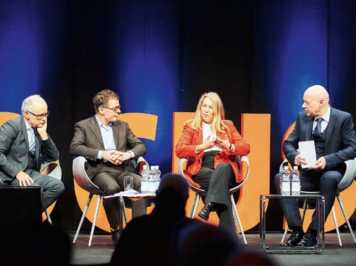
Prof. Bresch participated in a podium discussion at the external page SIA (Swiss Society of Engineers and Architects) Theme Day at the Swissbau 2018. In order for building planners to become resilient, three components are required according to Bresch: Foresight, the desire for change and individual responsibility. You can read more about the event (in German) in the Download TEC21 (PDF, 281 KB) document by SIA.
New article: A global historical data set of tropical cyclone exposure
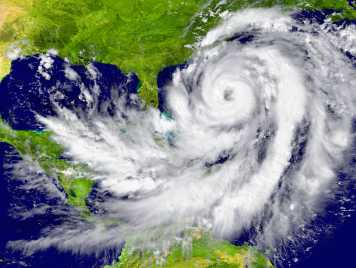
Tropical cyclones pose a major risk to societies worldwide, with about 22 million directly affected people and damages of US$ 29 billion on average per year over the last 20 years. While data on observed cyclones tracks... Read more
19.11.2017 – Switzerland can still do more regarding earthquake risks
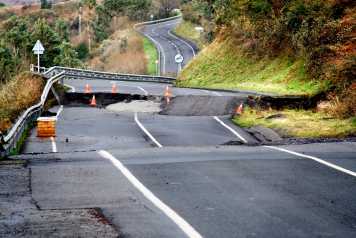
Professor David N. Bresch says that Switzerland has a well-developed insurance system for most natural disasters. When it comes to earthquake risks, however, this system could still be improved. Read more (in German) Download here (PDF, 310 KB).
03.11.2017 – Benedikt Knüsel receives D-USYS Award
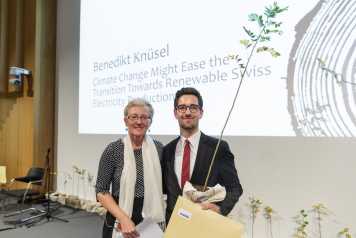
At the 2017 graduation ceremony of the Master Programme in Environmental Sciences WCR's Benedikt Knüsel received the Award of the Study Programme in Environmental Sciences 2017 for an outstanding Master thesis which contributes to the systemic understanding of environmental processes with a high societal relevance.
19.10.2017 – Is the Engelberg Valley prepared for the climate change?
26.09.2017 – Workshop "Indirect International Impacts of Climate Change"

On 26th September 2017, ETH Zurich, together with external page INFRAS and the external page Swiss Federal Office for the Environment hosted the workshop "Indirect International Impacts of Climate Change" at the Auditorium Careum in Zurich. Read more
12.09.2017 – Prof. David N. Bresch: "Nature does not create disasters, it generates events"
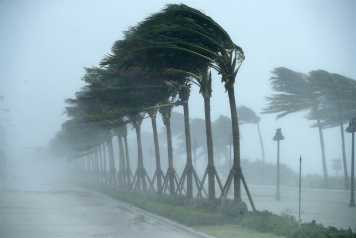
Risk is a combination of threat, exposure and susceptibility to damage, according to Prof. Bresch. “We can reduce our exposure, meaning not settle or dwell in certain areas.” However, this is not a solution for highly exposed, but also densely populated areas like e.g. Florida. In such cases Prof. Bresch is calling for risk-adequate behaviour: “We can reduce our vulnerability.”
02.08.2017 – Mittendrin im Klimawandel: Interview with David Bresch

The adaptation to climate change offers certain opportunities for social change, according to Prof. David N. Bresch. However, if adaptation remains the only strategy to deal with global warming this would have catastrophic consequences for the future. "If we don't succeed with decarbonisation, it will be too late for any kind of adaptation", says Prof. Bresch in his interview with the Freiburger Nachrichten on 2nd August 2017.
31.05.2017 – Cultural differences explain diversity of climate science for decision-making
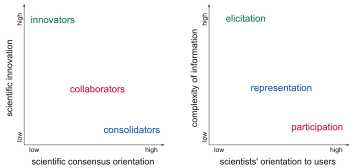
British, Swiss and Dutch climate scientists judge the usefulness of climate information for decision-making differently. For innovators... Read more
30.05.2017 – Inaugural Lecture "Vom Wetterrisiko zur Klimaresilienz"
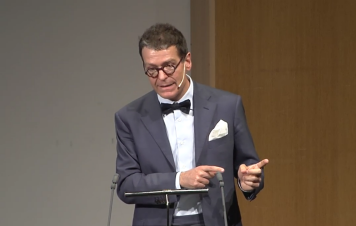
On 30th May 2017, Prof. David N. Bresch gave his inaugural lecture in the Audi Max of ETH Zurich. Watch the full lecture (in German) here.
27.04.2017 – Werkstattgespräch: Der Brückenbauer
Prof. David N. Bresch talks about how his research can be applied to reduce society’s weather and climate risks. (Talk in German)
06.12.2016 – Seminar at University of Miami, Rosenstiel School of Marine and Atmospheric Sciences, Miami, FL, USA
28.10.2016 – How climate change may (in)directly affect us
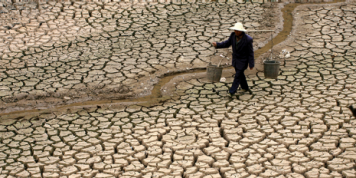
This year's ETH Klimarunde deals with the question of how globalised climate change affects us, and how we can deal with it.
11.03.2016 – David Bresch appointed as Professor for Weather and Climate Risks
Upon application of the President of ETH Zurich, Professor Lino Guzzella, at its meeting of 9/10 March 2016 the ETH Board appointed a total of ten professors. Read more
ETH Zurich Sustainability Report 2011–12
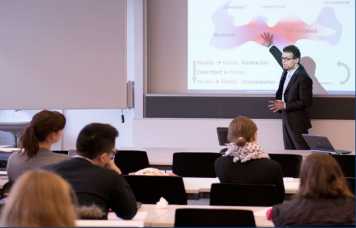
Universities are sustainable to the extent that they create knowledge that is relevant to the future of a society. But what will be relevant in the future? Because the future is by nature only predictable to a very limited degree, universities must be positioned broadly with respect to their disciplines. Read more on page 26

